Oceans and islands Part Four
Penguins, shipwrecks and whalebones – the Falkland Islands
When Captain Fitzroy and the ‘Beagle’ arrived at the Falklands in March 1833, Charles Darwin’s diary notes:
‘The first news we received to our astonishment, that English had taken possession of the Falkland Islands and that the flag was now flying. These islands have been for some time uninhabited until the Buenos Aires government a few years since claimed them and sent some colonists. Our government remonstrated against this….. The present inhabitants consist of one Englishman who has resided here for some years and has now the charge of the British flag, twenty Spaniards and three women….. As there is an abundance of good water and good anchorage, it is most surprising that it has not been long ago colonised, in order to afford provisions for ships going round the Horn. At present it is only frequented by whalers, one of which is here now’.

We dropped anchor
in the sheltered waters of Stanley harbour, Falkland Islands, on New
Year’s Day in 2020. It was thrilling to arrive after a month at
sea, but also a little sad as it was time to leave the ship and all
my travel companions.
Two things every sailor needs when he steps ashore – a pub and a wifi connection, preferably at the same time. Wifi is expensive in Falklands as it all comes in via satellite and even residents pay dearly for it. I ran through my £10 credit very quickly as my phone buzzed its way through a month’s worth of notifications and emails, but it was good to enjoy a glass of wine after a good dose of abstinence. Apart from special occasions I’d kept off the wine during the voyage.
Just because we were safely in harbour, though, the wind hadn’t finished with us yet. Instead of being ferried ashore in the tender the next morning with all our luggage, the wind blew to gale force after breakfast with gusts up to 60mph and the sheltered water of the harbour was full of whitecaps. It was hard to stand up, let alone use the tender. We had to wait until late afternoon before the crew were finally able to take us ashore and say our goodbyes. Our final trip in the dinghy was accompanied by two Commerson’s dolphins who played in our bow wave.
I’d booked into a hotel but it was too far to walk with luggage; one of my shipmates was staying in the same place. We were last ashore and the streets were empty, the visitor centre shut. How were we going to find a taxi? Dave went into a nearby cafe to ask if they could help, and came out with a local lady who offered to drive us to the hotel so we piled our bags into her landrover. ‘No problem’, she said, happy to help. ‘There’s no other way you’ll get there!’ My first introduction to this quirky, friendly, frustrating and rather wonderful place.
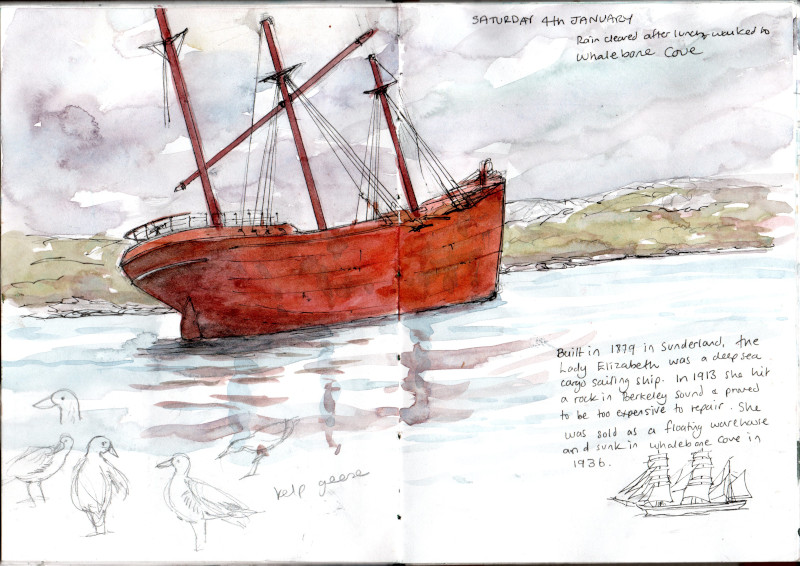
I spent 12 days in the Falklands and filled up 50 sketchbook pages. Lots of penguins of course, but plenty of other subjects too. Compared with Galapagos and Rapa Nui, the Falklands are by far the least touristy and hardest to get around. It’s a place of contradictions; the landscape feels familiar (a hint of Scottish wilderness) because of the Britishness of everything – red phone boxes, the lifestyle and people. But the familiarity suddenly ends when you notice that nearly all the buildings are single storey chalets with wood framed cladding and brightly coloured tin roofs. And the fact that there is no transport system (indeed, not much in the way of roads). The scars of war from 1982 still run deep and much of the infrastructure is new since then; the road to the airport is only now starting to be surfaced.
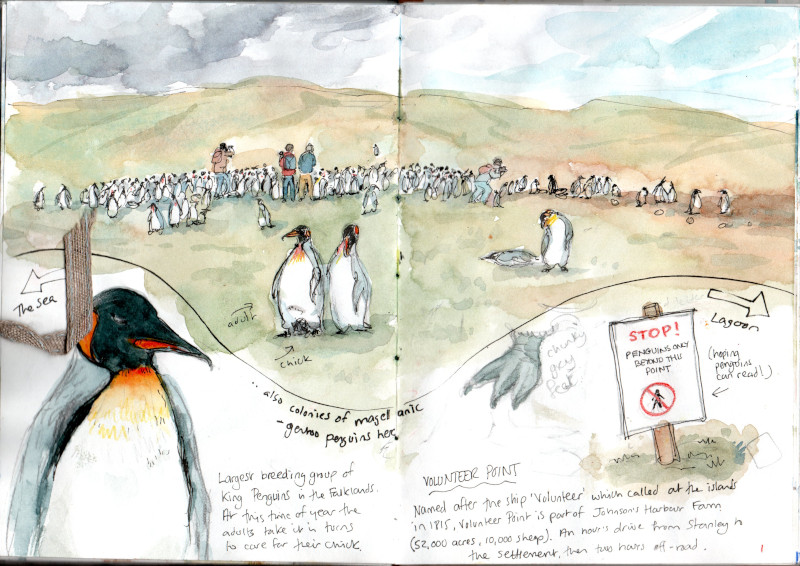
Reading the background to the protracted run up to the war it seems that back in the seventies, Britain was all for handing over the islands without a fight. The population was dwindling then – but now it’s growing fast and there is no unemployment. The once unprofitable little colony consisting of a handful of people and thousands of sheep has now increased its territorial waters and does well out of fishing licences in the fertile seas around the islands. Hundreds of cruise ships visit the islands every year and their passengers are taken by Landrovers on penguin spotting tours with the knowledgeable local guides.
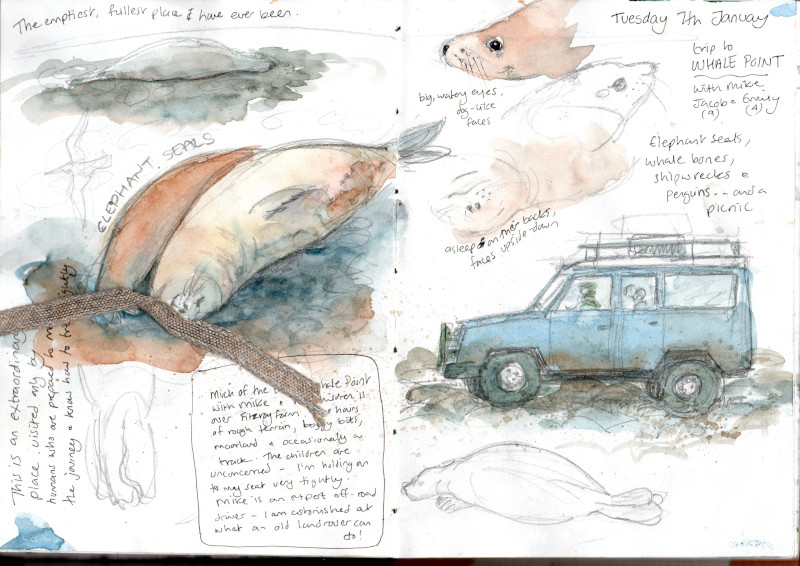
Almost everyone drives a 4×4, many of them battered and elderly Landrovers, because that’s how you get around. All the interesting landmarks are off road and on private land – and when I say off road, I don’t mean tracks. On my first trip out, a family picnic with the brilliant Mike Ford and his two young children, I was clutching the edge of my seat as the Landy bounced its way for two hours across open ground, peat bogs, dunes, streams, ridges and bumps. ‘Surely we can’t drive up there….? Good grief, we are…..’. The children, 9 and 4 years old, played happily in their seats in the back, unconcerned. Our ride ended at Whale Point, a wilderness of stony beach full of basking elephant seals, dunes littered with whalebones, a colony of gentoo penguins and, on the beach, the bleached and weathered remains of a wooden sailing ship. There was no-one else for miles around. We had our picnic on the wreck, watched over by two herons and several elephant seals.
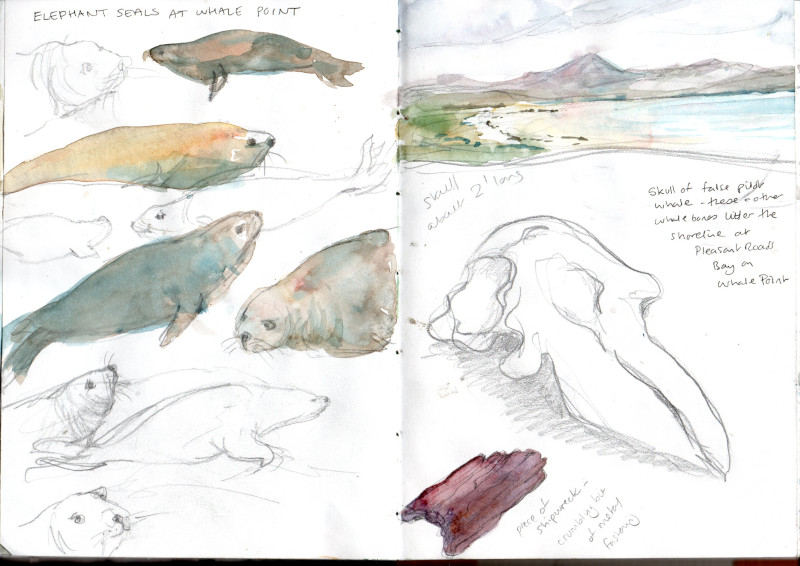
I was introduced to Mike and his wife Jo by a mutual friend and if it hadn’t been for Mike going out of his way to make sure I got around, I wouldn’t have seen anywhere near as much as I did. Mike works for Falklands Conservation so he knew a great deal about the natural history of the islands. It’s hard to get to the remote places without going on a tour, and these are geared up to groups, especially cruise ships. As a solo traveller with no pre-arranged plans and a limited budget, I would have been stuck in Port Stanley most of the time. I’d like to have visited the smaller islands, but that will have to wait for another time.
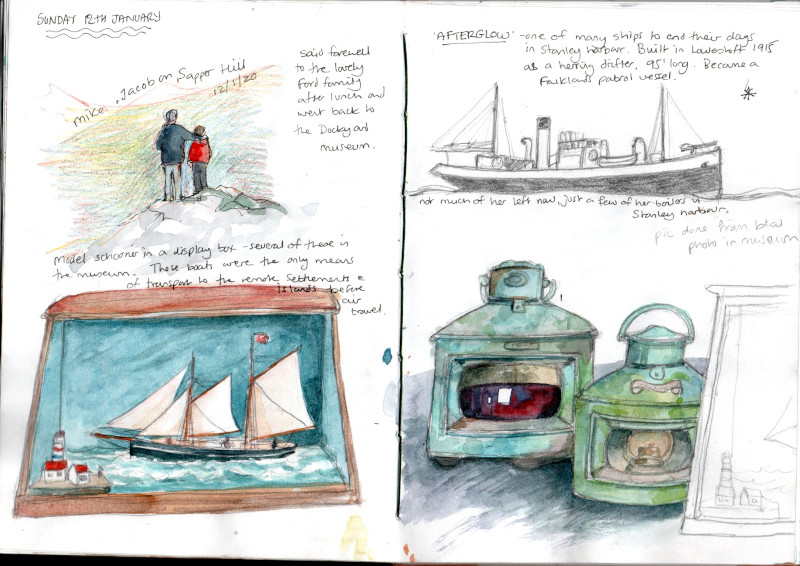
There was so much to draw that I filled more pages than I did on Galapagos and Easter Island combined. I think this was partly a result of having more time on my own, not being limited by being on a tour with groups of people. The other factor is having access to a table; this may sound odd, but I tend to start sketches on location and get the first splashes of paint on, then finish them off later once the paint has dried, adding colour, correcting, adding detail from memory, painting pebbles, feathers and beach finds, writing notes and generally filling the page. I had a small but useful desk in my room at Shorty’s Motel in Port Stanley; in the evenings and when the weather was bad I spent many an hour there. On the other islands I had less time and no table in my room to work at!
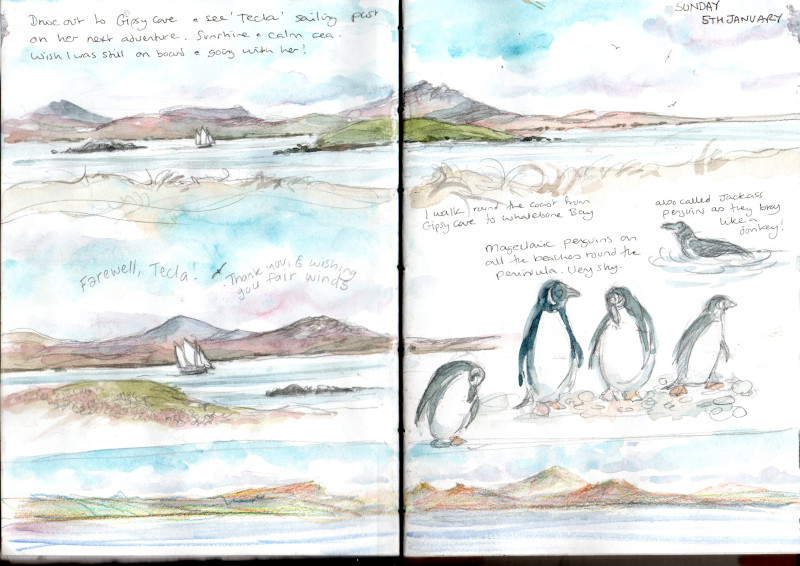
My flight home from Falkland was easy, though strong winds kept changing the timing and we were lucky to get away only 12 hours later than planned. I was booked onto the RAF Airbridge straight back to Brize Norton in the UK, only 18 hours with a refuelling stop in Cape Verde. There were few passengers, mainly locals going home on leave or students heading back to university, so I had four seats to myself and was able to lie down and nap much of the time.
I thought this long trip would cure my wanderlust and sea-longing, but of course it hasn’t. I’ve deepened my appreciation for the oceans and islands of this poor battered watery planet and for every item I tick off my bucket list I seem to add two more. What shall I do next? (bear in mind the rainy day pot is now empty). All sensible suggestions welcomed! For now, the priority is to get my feet back under the table at the studio, pay a scary number of bills and try and remember what on earth it is that I do for a living. I’ve not quite finished with the blog posts as I’ve had a request from other artists for more info about sketching on the move, but in the meantime thank you for all your encouragement and support, it’s much appreciated!

Well done Claudia, you have been where most people can only imagine going. I did note the comment on exploring the other islands another time. You are obviously planning on returning. Good for you.?⛵️✈️
Enjoyed reading about your adventures and the sketchbook drawings so much. Former long distance sailor now landlocked.?⛵️
Love the one with the penguin paparazzi …
Very good Claudia I can smell the see air and feel the strong wind in my face Thank you so much What a brave young lady you are xxx
Wow, just wow! I love your adventurous, sometimes slipper-clad soul X
Bob and I are amazed at your adventures. We both keep saying “Wow” (a word we don’t like!). We are speechless with admiration. Marvellous. Well done. We hope you publish a book. We will definitely buy it. Brenda Bob & Sage
What an adventure. I have always wanted to visit the Falkland Islands – looks beautiful. Great to read your blog and see your sketches. Inspiring! x
What an interesting adventurous time you have had. Loved reading your blog and seeing your illustrations. I have no idea how you follow that but I’m sure you’ll come up with something. Well done Claudia!
Oh Claudia! You’ve made me homesick for the Falklands! Your description is just brilliant! I loved living there and it sounds like things haven’t changed much! It’s my most favourite place on this planet – thank you xxxxx
Hi C, I struggled to find any penguins when I was there in April of 05. One small group on the far west coast if the island. I hired a little Suzuki jeep thing to get around, it was brilliant and not overly expensive. I did have one night B&B with a rather toffee nosed ret Police supt. in Darwin and one with a young couple struggling to keep a farm going in San Carlos. Great place, would go back again in a flash. Was the RAF flight expensive?
Hi Claudi, best geography lesson I ever had !! Your narrative and sketches deserve to be published in some form or other to be included into your life story which I’m sure you will write at some time later. What I’de like to know, when youve had a while to gather your thoughts, is how the the whole experience has changed you..??
Hi Claudia… children’s book? And an adult version too? You could do many given the varied, colourful facets of your skills & life. Pitch the BBC to do a travel cum art documentary of your next adventure? Some ideas that I think are worthy of this travelogue. Thank you so much